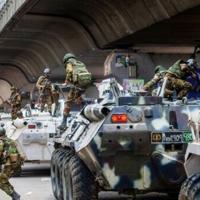According to police, more than 500 individuals, including opposition leaders, have been detained in Dhaka due to the ongoing violence in Bangladesh which has led to the deaths of 163 individuals since students began protesting against civil service hiring regulations.
Initially a protest against biased admission quotas for government jobs, the demonstrations have escalated into some of the most severe unrest during Prime Minister Sheikh Hasina’s term in office.
A curfew has been enacted and soldiers are patrolling cities throughout the country while a nationwide internet blackout has limited the flow of information to the outside world since Thursday.
“Over 532 people have been arrested in connection with the violence,” stated Dhaka Metropolitan Police spokesperson Faruk Hossain to AFP. These arrests include some leaders from the opposition Bangladesh National Party.
Despite the Supreme Court’s decision to reduce hiring quotas for specific groups for government jobs, student leaders continue to protest, resulting in nationwide clashes and the loss of 163 lives, including police officers.
Ali Riaz, a politics professor and expert on Bangladesh, described the recent violence as “the worst massacre by any regime since independence” and criticized the use of brute force by the government.
International diplomats have raised concerns regarding the government’s response to the protests and have questioned the foreign minister’s presentation which blamed the demonstrators for the violence.
With tensions escalating, the government has faced criticism for its handling of the protests and the use of force against unarmed civilians.
The detainments include high-ranking officials from the BNP and other political parties.
With millions of young people in Bangladesh facing unemployment, the reinstatement of the quota system for government jobs has sparked widespread protests and criticism, leading to clashes and casualties.
Despite some reforms to the quota system, protesters are demanding a complete elimination of the controversial “freedom fighter” category which they view as a tool for political manipulation and nepotism.
As the situation continues to escalate, concerns are growing over the government’s tactics to suppress dissent and maintain power in the face of widespread protests and civil unrest.
Hasina’s government has faced accusations of using state institutions to silence opposition and consolidate power, further fueling the ongoing crisis.





